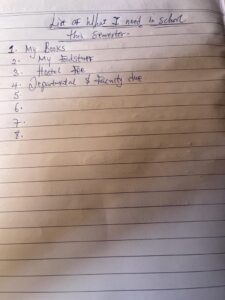Avoiding Sapa, How to Manage Money While in School, will be what we are going to be talking about. A popular saying goes “money is a terrible master, but an excellent servant“. Not everyone may fully understand this concept and just see it as a saying, Managing money in school.
However, the quote above simply explains how our attitude toward money influences our daily life. It is a terrible master when we misuse it but becomes an excellent servant when we use it wisely.
“I need money“, “sapa dey“, “economy is hard“. These are some of the popular sayings among students. True enough, we all need money but what do we do when we have the money? Do we save, invest or spend lavishly? At the end of the day, would we be in ‘sapa’ or would we have some savings? All these ties down to finance management.
As students, we all know what sapa is. We say “sapa dey” when we no longer have foodstuffs or little or no cash at all. It’s basically survival mode. Managing your finances in school will help you avoid sapa as much as possible.
While in school, you could be receiving your allowance either monthly or weekly. If you are not prudent in your spending, you might run out of money even before the month or week runs out. We all have needs and sometimes our finances are not sufficient enough to cater for all our needs. The big question here is, how do I manage my finance while in school? It’s quite easy if we truly are interested in it.
8 WAYS TO MANAGE YOUR FINANCE WHILE IN SCHOOL.
1. Purchase Durable Goods.
Another way to put this is by buying quality goods. As much as you are trying to save money, buy durable and quality goods that can last over a period of time instead of buying substandard goods because it is very cheap.
Don’t forget, if that product does not last as long as it is meant to or even serves its purpose, you will find yourself spending more on repairs than what you would have spent in buying long-lasting products. It also creates a dent in our finances as we pay for non-budgeted repairs or replacements.
For example, if you belong to departments like Medicine, Engineering, Law, or certain Art courses that require wearing shoes for practical classes, it’s better to invest in a durable pair of shoes that will last a long time instead of buying cheap ones that need to be replaced every three weeks. I remember wearing leather shoes throughout my first to third year in university, while my friends spent more money on frequently changing their shoes. It’s wise to make smart choices.
2. Buka 6 Shouldn’t Be Your New Home.
Buka 6 is a popular restaurant in most universities. To save money, try to reduce how often you eat outside. When you receive your monthly or weekly allowance, some students spend all their time eating at food joints throughout the day. Constantly eating out can quickly drain your money without you realizing it. Instead, try cooking in your school hostel.
With just #1500, you can cook a pot of beans or rice that will last you for more than two days. On the other hand, buying food at a restaurant can cost you around #700 for a single meal. If you calculate the costs of eating three meals this way, you’ll see it adds up.
3. Having A List Of Priorities/Having A budget.

Having a Budget can help minimize your expenses. After savings have been deducted, write down a list of what you need in order of preference, that is, the most important things to the least necessary things.
If you need a pair of shoes and foodstuff and your money is enough for only one, would you buy the shoe, although you already have a functional pair, and go hungry or buy the foodstuff and leave the shoe for later? Of course, the foodstuff comes first. Having a list will make you conscious of spending and prevents a lack of necessary needs.
4. Avoid Impulse Buying.

Avoid impulse buying as much as possible. Impulse buying is one thing that is common among students. Buying things that you don’t need at all or won’t be needing for a very long time affects our budgets on a large scale.
You may make a purchase just because a friend is buying it or you just like it when you have no need or use for it. That’s already a deduction from what could have been saved or used for emergencies. If you don’t need it why buy it? Is it because it is fine, or it’s the trending thing, or just because you felt like buying it? For the fact that it is not on your budget, don’t buy it. Look away and as time goes on you would be happy you did.
5. Practice Saving Habits.

One of the major ways of managing your savings while in school is for you to save. Saving cannot be overemphasized. No matter how much you get as an allowance in school, no matter how little, save a percentage of the money. The saying “little drops of water make a mighty ocean” is actually real.
Don’t say because you got #5000 for a month, you can’t save. Having a lite extra here and there can go a long way and meet future needs. How? If you save 200 naira every week, at the end of the month, you would have 800 naira extra, at the end of the year, you would have over ten thousand naira added to your usual amount. So, as much as possible, save, and be committed to it.This will help you in managing money in school.
6. Have A Little Source Of Income.
Having a legal side hustle will also help you manage your finances. Although this may not be convenient for some students, it’s another way to add to your allowance and it also enhances your savings.
When you are earning as you are spending, more needs are met and even leaves more for your wants and leisure time. Once you are able to manage your time well and having a job does not affect your studies, go ahead and do it. It would really help even if its a little bit.
7. Avoiding Unnecessary Expenses.
Avoiding unnecessary expenses can help conserve your finances to be able to manage your finances in school and avoid “sapa”, and do little chores yourself instead of spending money to get them done. Little things such as doing your laundry instead of giving it to the laundromat.
Do you have a little tear in your cloth? Get a needle and thread and get it done instead of paying someone else to do it. Doing these may appear stressful, but the amount saved from it is worth the stress, and would definitely help in cutting down expenses. This also help you in managing money in school.
8. Live Within Your Means.
Spend according to what you can afford. Many students end up spending too much because they see their friends doing the same. For instance, when it comes to accommodation, choose a cheaper apartment or stay in the school hostel.
Avoid going beyond your financial capabilities and always consider your parents’ finances before making any decisions. Don’t buy expensive clothes just because your friends are buying them. If you earn #20,000 per month while your friend earns #40,000, remember that your spending habits should not be the same. This will help you in managing money in school.
Related:10 Best Ways to Avoid Distraction as a Fresher in Nigeria Universities.
AlSO SEE: 10 ways not to sleep in a night class.
Leave a Reply